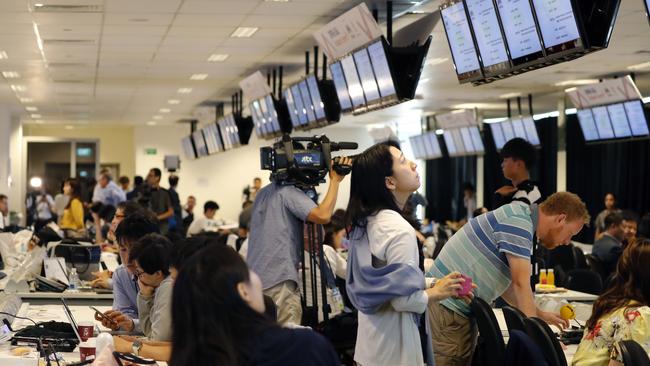
So here we are, the moment the world has been waiting, for and no one, not even Donald Trump, knows exactly what will happen.
But some conclusions can be drawn. The US President and North Korea’s Kim Jong-un have advanced the cause of peace by simply holding their first ever meeting in Singapore today.
The alternative was for both leaders to threaten to rain fire and fury upon each other and to ratchet up tensions to a the level that unnerved the world last year.
Even if the negotiations over denuclearisation of North Korea collapse, the world will be no worse off than it was last year.
Trump’s critics may or may not be right when they say Kim will never surrender all his nuclear weapons and that he is playing a tactical game to get relief from crippling economic sanctions.
But they are flat-out wrong to say Trump should not roll the dice and try to broker an agreement that could solve the world’s most pressing security problem.
It appears likely that Kim will give some sort of promise to denuclearise his country. He gave the same commitment to his South Korean counterpart, Moon Jae-in, at their April summit.
But whether Kim will offer more than a broad promise remains unclear. Trump will be hoping for agreement on a timeline for denuclearisation, but it may be far too early for Kim to contemplate that.
Kim may surprise by offering some quick unilateral and concrete actions to lend credibility to any promise of denuclearisation. In return, Trump could surprise by offering some form of early security benefits, such as a reduction in US troops in South Korea or a scaling back of military exercises between the US and South Korea.
At a minimum, both men will size each other up and determine whether they can work together and trust each other.
The only downside risk for Trump is that he will be embarrassed if — after travelling halfway around the world to be in Singapore — Kim comes to the table with nothing more than vague promises.
But Trump himself has almost certainly spoken to Kim by phone — he betrays this by repeatedly refusing to comment about it when asked. Meanwhile, Secretary of State Mike Pompeo has done the heavy spadework in preparing for the summit. The Americans must have made the calculation that Kim was willing to give something worthwhile or they would not be in Singapore today.
For Kim, the downside risk is minimal. Today’s summit will validate him. Meeting with the most powerful man on earth legitimises his status and will be seen in North Korea as proof that the country is a nuclear nation to be reckoned with.
The greater risk for Kim is a domestic one: he must not give the perception that he is completely surrendering to the US and abandoning his nuclear arsenal for nothing substantial in return.
However, Trump is right to say it makes sense for Kim to give up his nukes.
The reason successive US presidents never used military action to destroy the regime in Pyongyang is because of the conventional firepower North Korea’s artillery could rain down on nearby Seoul.
It is not because of North Korea’s nuclear weapons. As such, Kim could give up his nuclear weapons without opening his country to invasion. It would lead to a lifting of economic sanctions, a wholesale rebuilding of the country and a re-entry into the international community. If Kim could manage such an abrupt pro-Western U-turn without triggering a coup from Soviet-era hardliners in Pyongyang, then he and his country would be winners.
It’s not a bad potential deal. No wonder it appears to be playing on Kim’s mind. We may find out today whether the dictator is serious about snatching what Trump calls a “one-shot” chance at making history.




